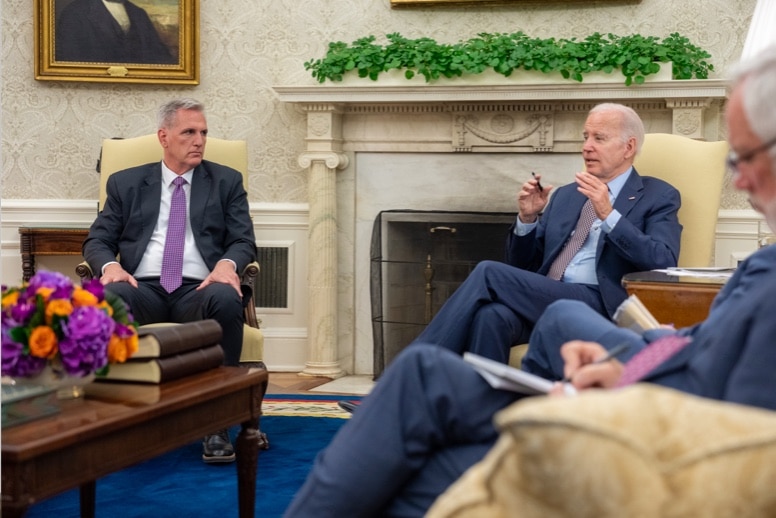President Biden and House Speaker Kevin McCarthy (R-CA) met for several hours Monday evening at the White House but still have not reached an agreement to prevent the U.S. from defaulting on its debt.
“I just concluded a productive meeting with Speaker McCarthy about the need to prevent default and avoid a catastrophe for our economy,” Biden tweeted Monday night. “We reiterated once again that default is off the table and the only way to move forward is in good faith toward a bipartisan agreement.”
Biden went on to say that while “there are areas of disagreement,” he, McCarthy and his lead negotiators—House Financial Services Chair Patrick McHenry (R-NC) and Congressman Garret Graves (R-LA)—along with their staffs “will continue to discuss the path forward.”
McCarthy told reporters after the meeting that while there’s still no deal, “I did feel like the discussion was productive.”
He later added that he felt like the tone of the talks was “better than any other time we’ve had discussions.”
McCarthy also said that negotiators were going to “work through the night” to try to find common grounds.
“We’ll keep working,” Steve Ricchetti, counselor to the President, echoed Monday evening.
Though the debt ceiling has been raised cleanly, without any strings attached, in years past, House Republicans have passed legislation that ties a short-term debt ceiling hike to decade-long spending cuts.
The bill, which passed in the House along partisan lines, includes cuts to veterans’ benefits and work requirements for Medicaid recipients. As-is, Democrats have called it a non-starter.
Biden told reporters over the weekend that he would not agree to a deal that “protects, for example, a $30 billion tax break for the oil industry” or goes after Medicaid.
The federal government hit its $31.4 trillion debt limit on January 19, after which the U.S. Treasury undertook what Secretary Janet Yellen called temporary, “extraordinary measures” to prevent defaulting on the debt.
She has warned June 1 would be the day the government runs out of money, a date she reaffirmed over the weekend.
“There will be no acceptable outcomes if the debt ceiling isn’t raised, regardless of what decisions we make,” she said Sunday.
The United States has never defaulted on its debt. But it has repeatedly come close, perhaps most notably in 2011 when the U.S. suffered its only credit rating downgrade in its history, amid the rise of the conservative tea party movement in the House.


